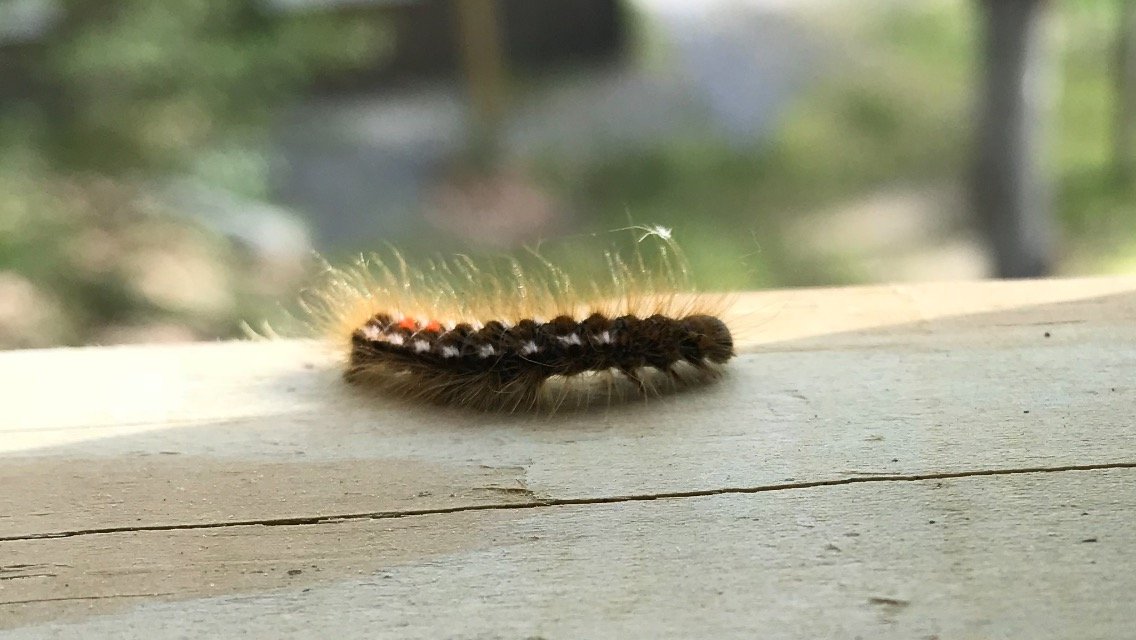
Health advisories on Maine insects: Don’t let the bugs get you down!
Maine is host to many beautiful creatures - there is nothing quite like hearing the loons out on the lake at night, or seeing the Alewives in their migration. But Maine in summer also plays host to a variety of other creatures, who may present us humans with challenges from time to time. Here are some general advisories for Maine in summer.
The browntail moth caterpillar
The caterpillar of the browntail moth is beautiful, but unfortunately hugely invasive in Maine. Additionally, it possesses hairs that dislodge and can cause bad itching and rashes on human skin. For some people with particularly sensitive respiratory systems or conditions such as asthma, sometimes the browntail moth hairs can also cause flare-ups; masks can help mitigate this, if it’s a particularly bad year for them. Camp Wavus treats its campus for browntail moths, but you’re still bound to see some. The general advice is to not touch them, and if one gets on your clothes, to remove the caterpillar using something other than your hands, and wash your clothes at the soonest opportunity. We do not recommend leaving towels or bathing suits outside to dry to assure none of these hairs land on things we use on our skin. Learn more about the browntail moth caterpillar.
Ticks
Maine is a notorious home for dog and deer ticks. During the summer months when the Conference is held, dog ticks are more common than deer ticks, but deer ticks are also still very present. Deer ticks specifically notably carry some transmittable diseases. To proactively prevent tick-borne infections, the general recommendation is to avoid areas with tall grass or thick brush, or else wear thick, light-colored pants over tall socks. Perform tick-checks after walking in these types of landscapes or fields, and after long walks, especially near brushy areas. If a tick is discovered, even if it has attached, removing it with tweezers or a tick spoon within 24 hours generally prevents the transmission of Lyme disease. Learn more about ticks in Maine.
Accessibility at the Conference and Camp Wavus
Mobility
While most of the hills at Wavus are gentle gravel paths, there are a few more intense climbs at the camp. Some cabins at Wavus are closer to the main building or located on flatter ground, and may therefore be better suited to people who require wheelchairs or other mobility aids, or who are not able to walk longer distances or up or down hills. Cars are available for transporting people farther distances or up/down hills if needed. If you anticipate this need, please reach out to the conveners at the time of registration.
Comfort
Many of the programs during the Conference take place over 1-2 hours. Folding chairs are provided. Many attendees bring along their own chairs and seating types, rugs or blankets to sit upon, if folding chairs are uncomfortable.
Dietary Needs
Wavus will provide three meals a day for the participants and we ask that you communicate any dietary restrictions with registration to be sure we have enough time to assure appropriate accommodations.
Hearing and Audio
Many of the programs at the Conference are held on stage using amplified sound, however at this time, the Conference does not employ its own Sign Language Interpreter. The use of hearing aids or other devices is encouraged. Please communicate during registration what you may need.
Emergency Procedures
Camp Wavus is located in Jefferson and in the service area for MaineHealth Lincoln Hospital in downtown Damariscotta, ME. The camp has emergency supplies for urgent first aid, and defibrillators, fire extinguishers and water safety equipment.
COVID-19 Policies
The national COVID-19 emergency may officially have ended, but the infection caused by this virus is still prevalent and contagious, and can cause life threatening illness. Because of this we have written the following policy to be in keeping with the policies of our location (Camp Wavus) and of Maine.
COVID-19 Safety Policy:
To ensure the health and safety of all participants at the 2025 Great Mother Conference, we ask attendees to commit to these actions:
Bring at least three rapid antigen tests for use during the week: upon arrival, 2-3 days after travel, and if symptoms develop.
Be prepared to test if you develop COVID-like symptoms (including ones you may believe to be allergies) during the week, and be prepared to depart if you test positive for COVID during the week.
We strongly recommend obtaining vaccinations and boosters to protect against COVID-19 infection and its serious consequences, according to eligibility by age group and medical condition.
Further strategies for health and precautions we recommend include:
Limiting high-risk or high-exposure activities in the days leading up to the conference (avoiding crowds, using ventilation and physical spacing, wearing masks in enclosed spaces, etc.).
Take a rapid antigen or other test and confirm a negative result before traveling to the event;
Wear a high-quality mask (N95 or KN95) when on public transportation and traveling to the event.
We will strongly encourage attendees to keep windows in the cabins and meeting areas open during the week to increase ventilation. You may want to bring extra warm bedding, layers of clothing.
We welcome and encourage masking during the event, but do not require it. These additional measures can help protect the valued immunocompromised and elders among us, in addition to keeping us all healthy.

